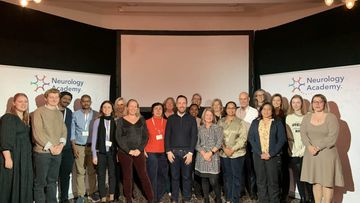Focus on the workstreams: Audit
A pragmatic rolling UK MS audit: What data to collect and how to collect it painlessly
 Jeremy Hobart, Professor of Clinical Neurology and Health Measurement at Plymouth University Peninsula Schools of Medicine and Dentistry is the representative on the national ‘Raising the bar’ steering group and lead for this workstream.
Jeremy Hobart, Professor of Clinical Neurology and Health Measurement at Plymouth University Peninsula Schools of Medicine and Dentistry is the representative on the national ‘Raising the bar’ steering group and lead for this workstream.‘Of course auditing will identify limitations, but we mustn’t be scared by that!’
Objectives:
- To agree on the components, and size, of an achievable pragmatic national rolling MS audit to aid quality improvement;
- To determine how we can acquire those data with minimum effort and disruption to enable rapid implementation and success;
- To consider appropriate outputs and mechanisms for leveraging support.
Why this workstream?
Throughout the two day conference, delegates and speakers alike repeatedly outlined the evidence that audit and quality improvement tools help advance care quality and to drive policy changes. we presented and discussed some audit and quality improvement tools. Importantly, they highlighted that audits will, by definition, reveal challenges and service limitations. The key message that Professor Jeremy Hobart, lead for this workstream, wants to share is that ‘We need to understand and embrace these issues, using them to drive positive change.’The vision for this workstream is to establish a pragmatic UK rolling MS audit generating, amalgamating and comparing agreed minimum data from many centres. The view is that this will put health care professionals in a powerful position to instigate change locally and nationally. ‘For example, we will better understand the real extent and nature of variance in MS care, highlighting inequalities which can be used to drive local and national change’, expands Jeremy.Many challenges were raised during debate around audit at ‘the Way Forward’, with the core difficulties, as is often the case, being time and money. ‘We recognise everyone’s shared frustrations over obtaining financial backing from Trusts or even the staff time required to undertake audit,’ Jeremy says. ‘This is another challenge for this workstream to consider. However, the messages from ‘the Way Forward’, are that change should start with us and we have the power to instigate it.’What to expect
Our aims are:- to agree on a minimum dataset that everyone feels is able to be collected, including:
- to consider which data are most likely to be powerful,
- to agree on the size in terms of the number of people (patients),
- number of data-points and
- how the audit might be conducted.
- to examine how we can acquire these data as painlessly as possible prospectively
- to identify what support we all need going forward.
- to share experiences and exemplars of care development.
More information:
- Listen to Jeremy speak in response to Professor Ben Bridgewater’s shared learning from cardiac surgery at ‘the Way Forward’ last year.
- Read our Spotlight article on developing the tools and systems to end service variance featuring Jeremy’s thoughts on audit and quality improvement tools.
- Take a look at some of the audit tools available including the quality recommendations linked to ‘MS Brain Health: Time Matters’ and the iMed tool (both discussed in the above mentioned article).
Related articles
Encouraging excellence, developing leaders, inspiring change
MS Academy was established five years ago and in that time has accomplished a huge amount. The six different levels of specialist MS training are dedicated to case-based learning and practical application of cutting edge research. Home to national programme Raising the Bar and the fantastic workstream content it is producing, this is an exciting Academy to belong to.


